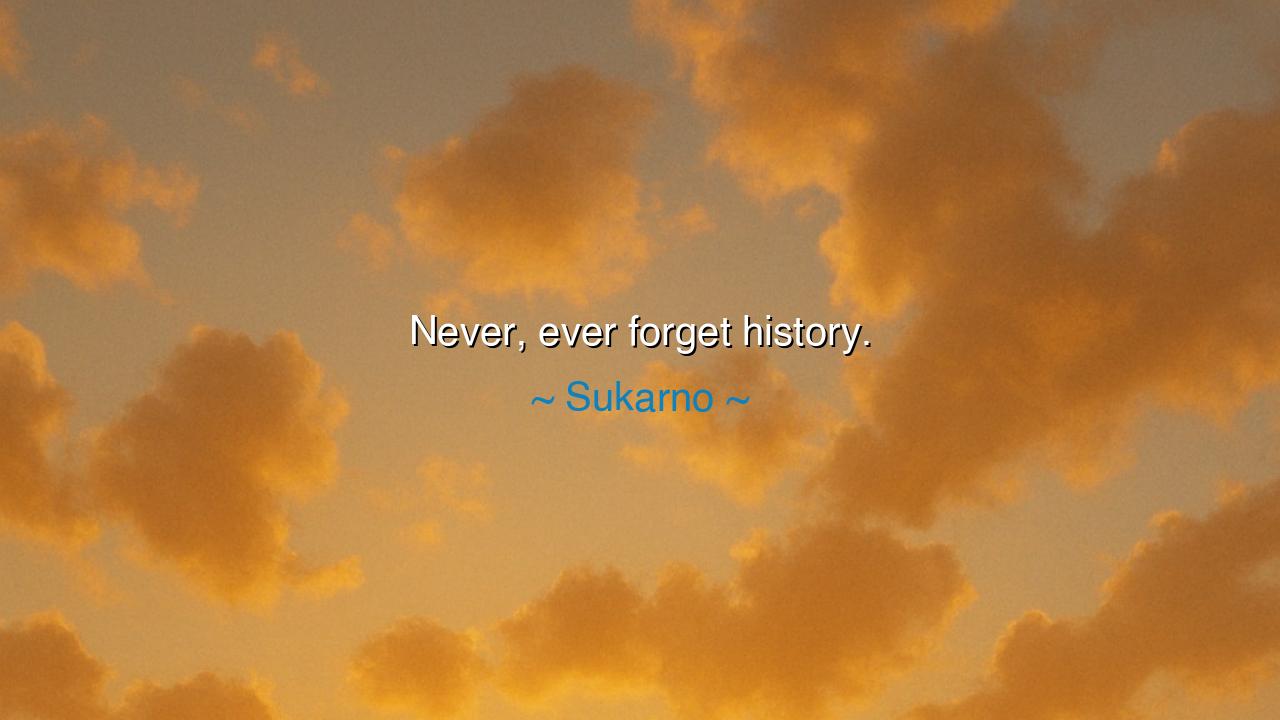
Never, ever forget history.






“Never, ever forget history.” – Sukarno
These were the words of Sukarno, the fiery orator and first President of Indonesia, the man who awakened a people long chained under colonial rule and led them into the dawn of independence. His command — “Never, ever forget history” — was not uttered lightly. It was both a warning and a prayer, a cry to his people that they must never let the memory of their struggle fade, nor the lessons of their ancestors be lost to the winds of time. For Sukarno understood what every wise leader before him had known: that a nation without memory is a body without soul, and a people who forget their past are doomed to repeat its suffering.
The origin of these words lies deep within the crucible of Indonesia’s liberation. For centuries, the archipelago had been ruled by foreign powers — first by traders, then by empires, who plundered its islands for spices, gold, and labor. The spirit of the people was battered but never broken. From the fire of this oppression rose Sukarno, who united hundreds of tribes, languages, and islands under one flag. When independence was won, he knew that the struggle was not over — that the real danger lay not in the might of the colonizer, but in the amnesia of the freed. To forget history, he warned, was to lose the very flame that had brought them freedom.
His words echo through the ages, for this truth is not Indonesia’s alone — it belongs to all humankind. Every civilization that has ever fallen has done so, in part, because it forgot its history. Rome, once master of the known world, decayed not through invasion alone, but because it lost sight of the virtues that had built it: discipline, unity, and justice. Its citizens grew complacent, its leaders corrupt, its people soft with luxury. The lesson of history — that freedom demands vigilance — was forgotten, and so Rome became a lesson itself. This is what Sukarno feared for his own people, and what every generation must fear for theirs: the sleep of memory, which is the death of nations.
To remember history is not merely to recount names and dates; it is to keep alive the wisdom written in the blood of our ancestors. It is to honor their courage, to understand their errors, and to see in their victories and defeats the map of our own destiny. Sukarno knew that history was not a burden, but a compass. It tells us who we are and who we must never become. Without it, a people are like leaves torn from their roots — blown by every wind, lost to every storm. But with it, they stand like trees whose roots reach deep into the soil of time, unshaken even by the fiercest winds of change.
Consider the story of Indonesia’s struggle for independence itself. It was not merely a political war — it was a battle for identity, for memory. Sukarno and his compatriots drew strength from the ancient kingdoms of Majapahit and Srivijaya, from the legends of heroes who had once united the islands long before foreign powers came. He invoked these memories in his speeches, reminding the people that they were heirs to greatness, not victims of fate. By remembering their history, the Indonesians reclaimed their pride. Their revolution was not only against colonial rule, but against forgetfulness — and that, perhaps, was its greatest triumph.
Sukarno’s command also carries a deeper, personal truth. For history is not only the story of nations, but of individuals. Each person carries within them a history — of choices made, lessons learned, and scars earned. To forget one’s own history is to repeat one’s mistakes, to wander blindly through the same cycles of pain. The wise do not flee from memory; they study it. They use it as a mirror to understand who they are and as a lantern to see where they must go. As it is with nations, so it is with souls: those who forget their past forfeit their future.
So, my child of tomorrow, heed this ancient call: Never, ever forget history. Read it, speak it, teach it. When you see injustice, remember the centuries of those who suffered before you, and rise as they did. When you taste freedom, remember what it cost, and guard it with your life. When you build, remember the ruins that lie behind you, and let them remind you of what must never be again. For history is not a shadow to escape, but a torch to carry. Let it burn brightly in your hands, and you will not only honor the past — you will light the way for all who follow.






AAdministratorAdministrator
Welcome, honored guests. Please leave a comment, we will respond soon